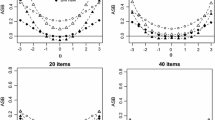Abstract
Assuming item parameters on a test are known constants, the reliability coefficient for item response theory (IRT) ability estimates is defined for a population of examinees in two different ways: as (a) the product-moment correlation between ability estimates on two parallel forms of a test and (b) the squared correlation between the true abilities and estimates. Due to the bias of IRT ability estimates, the parallel-forms reliability coefficient is not generally equal to the squared-correlation reliability coefficient. It is shown algebraically that the parallel-forms reliability coefficient is expected to be greater than the squared-correlation reliability coefficient, but the difference would be negligible in a practical sense.
Similar content being viewed by others
References
AERA, APA & NCME (1985/1999). Standards for educational and psychological testing. Washington, D.C.: Author.
Bock, R.D., & Aitkin, M. (1981). Marginal maximum likelihood estimation of item parameters: Application of an EM algorithm. Psychometrika, 46, 443–459.
Bock, R.D., & Mislevy, R.J. (1982). Adaptive EAP estimation of ability in a microcomputer environment. Applied Psychological Measurement, 6, 431–444.
Green, B.F., Bock, R.D., Humphreys, L.G., Linn, R.L., & Reckase, M.D. (1984). Technical guidelines for assessing computerized adaptive tests. Journal of Educational Measurement, 21, 347–360.
Feldt, L.S., & Brennan, R.L. (1989). Reliability. In R.L. Linn (Ed.), Educational measurement (3rd ed., pp. 105–146). New York: Macmillan.
Feldt, L.S., Steffen, M., & Gupta, N.C. (1985). A comparison of five methods for estimating the standard error of measurement at specific score levels. Applied Psychological Measurement, 9, 351–361.
Haertel, E.H. (2006). Reliability. In R.L. Brennan (Ed.), Educational measurement (4th ed., pp. 65–110). Westport, CT: American Council on Education and Praeger.
Kim, J.K., & Nicewander, W.A. (1993). Ability estimation for conventional tests. Psychometrika, 58, 587–599.
Lord, F.M. (1980). Applications of item response theory to practical testing applications. Hillsdale, NJ: Erlbaum.
Lord, F.M. (1983). Unbiased estimators of ability parameters, of their variance, and of their parallel-forms reliability. Psychometrika, 48, 233–245.
Lord, F.M. (1986). Maximum likelihood and Bayesian parameter estimation in item response theory. Journal of Educational Measurement, 23, 157–162.
Lord, F.M., & Novick, M.R. (1968). Statistical theories of mental test scores. Reading, MA: Addison-Wesley.
Mellenbergh, G.J. (1996). Measurement precision in test score and item response models. Psychological Methods, 1, 293–299.
Nicewander, W.A., & Thomasson, G.L. (1999). Some reliability estimates for computerized adaptive tests. Applied Psychological Measurement, 23, 239–247.
Raju, N.S., & Oshima, T.C. (2005). Two prophecy formulas for assessing the reliability of item response theory-based ability estimates. Educational and Psychological Measurement, 65, 361–375.
Samejima, F. (1994). Estimation of reliability coefficients using the test information and its modifications. Applied Psychological Measurement, 18, 229–244.
Sireci, S.G., Thissen, D., & Wainer, H. (1991). On the reliability of testlet-based tests. Journal of Educational Measurement, 28, 237–247.
Sympson, J.B. (1980). Estimating the reliability of adaptive tests from a single test administration. Paper presented at the annual meeting of the American Educational Research Association, Boston, April 1980
Thissen, D. (1990). Reliability and measurement precision. In H. Wainer (Ed.), Computerized adaptive testing: A primer (pp. 161–186). Hillsdale, NJ: Erlbaum.
Thissen, D. (1991). MULTILOG: multiple, categorical item analysis and test scoring using item response theory [Computer program]. Chicago: Scientific Software International.
Warm, T.A. (1989). Weighted likelihood estimation of ability in item response theory. Psychometrika, 54, 427–450.
Weiss, D.J. (1982). Improving measurement quality and efficiency with adaptive testing. Applied Psychological Measurement, 6, 473–492.
Author information
Authors and Affiliations
Corresponding author
Rights and permissions
About this article
Cite this article
Kim, S. A Note on the Reliability Coefficients for Item Response Model-Based Ability Estimates. Psychometrika 77, 153–162 (2012). https://doi.org/10.1007/s11336-011-9238-0
Received:
Revised:
Published:
Issue Date:
DOI: https://doi.org/10.1007/s11336-011-9238-0




